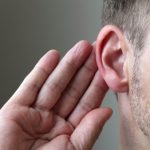 Do you cringe when you hear your voice in a video or voicemail? Don’t feel ashamed because many of us react the same way. That playback of our voice sounds completely different, and most of the time we hate it. Even when friends and family assure us we don’t really sound like that, we can’t help but think we actually do. But why exactly do we avoid listening to ourselves?
Do you cringe when you hear your voice in a video or voicemail? Don’t feel ashamed because many of us react the same way. That playback of our voice sounds completely different, and most of the time we hate it. Even when friends and family assure us we don’t really sound like that, we can’t help but think we actually do. But why exactly do we avoid listening to ourselves?
How does the ear work?
 In order to understand why we dislike the sound of our own voice, it’s important to first know how the human ear transmits and creates sound.
In order to understand why we dislike the sound of our own voice, it’s important to first know how the human ear transmits and creates sound.
Advertisement
The ear is divided into three main parts: Inner, middle and outer. The outer ear contains the ear canal and eardrum. This is where sound enters and travels through the ear canal and hits the eardrum. This causes vibrations and waves.
The middle ear is immediately behind the eardrum and consists of three small bones called auditory ossicles. Ossicles create a chain from the eardrum to the opening of the inner ear. The vibrations which were created and sent from the eardrum vibrate through the ossicles which move the fluid in the inner ear.
Lastly we have the inner ear – also known as the cochlea – where the movement of fluid occurs. This moving fluid changes and redirects hair cells, sending electric signals from the inner ear to the auditory nerve in the brain. The sounds we hear become those electrical signals.
Why we dislike our voice
 When we hear our voice on a playback, and when we hear other individuals speak, it goes through the process listed above. However, when we speak, additional vibrations are caused in the inner ear and eardrum due to air being released from us. Vocal chords, too, can add additional vibrations. These extra vibrations all get sent to the auditory nerve which translates the electric signals into sound that we can hear.
When we hear our voice on a playback, and when we hear other individuals speak, it goes through the process listed above. However, when we speak, additional vibrations are caused in the inner ear and eardrum due to air being released from us. Vocal chords, too, can add additional vibrations. These extra vibrations all get sent to the auditory nerve which translates the electric signals into sound that we can hear.
Typically, when we hear ourselves in playback we sound lower-pitched, and this is due to the body’s ability to carry low, rich tones better than higher ones. Therefore, when there are numerous sources of sound, we will hear lower, richer tones. So if you’re a woman, you may feel you have a ‘manly’ voice when you really don’t.
Hearing isn’t the only misperception our bodies put on us – image, too, can be skewed.
We don’t look like what we see
Advertisement
How many times do you look at yourself in the mirror? Maybe some days more than others and sometimes more intentionally than most. Regardless, that image you get back may not be a true reflection of yourself. In fact, it’s a mirrored image.
We tend to rely on mirrors to get an idea of what we look like, but this flipped image can cause a level of distortion, causing us to disapprove of the way we look in a photograph.
Hearing and vision are part of the five essential senses of the human body, but even our own senses can give us a different perception. It’s important to recognize these changes as to not be as hard on ourselves. You probably look and sound much better than you think!
